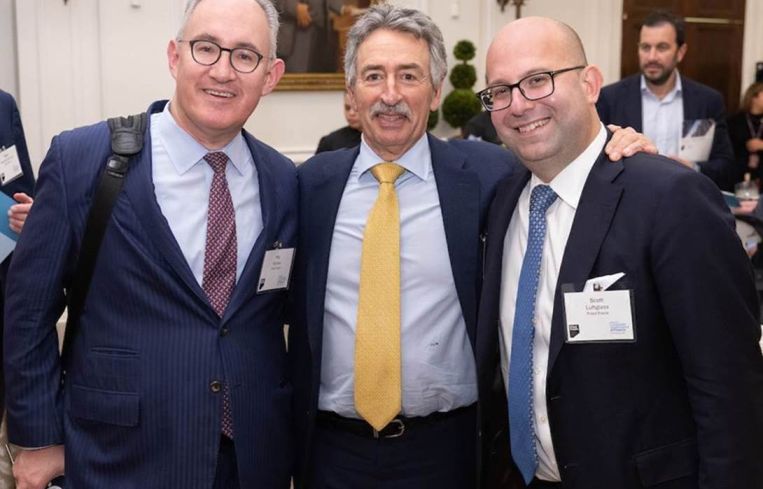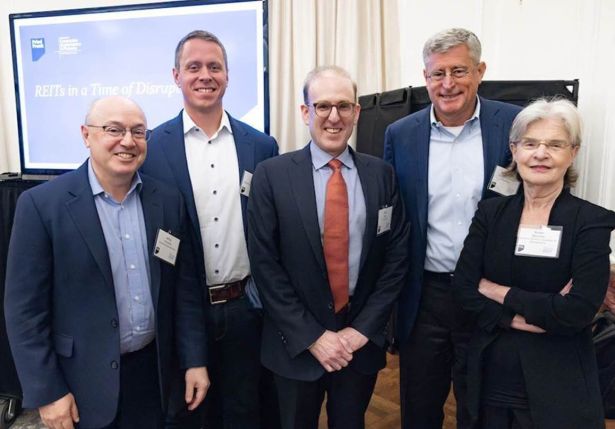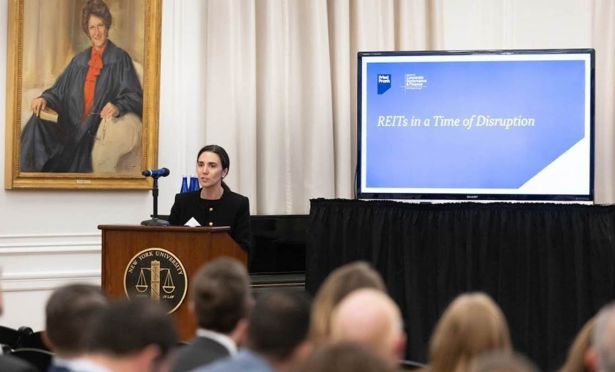Presented By: Fried, Frank, Harris, Shriver & Jacobson
NYU/Fried Frank’s REIT Forum Proves Its Value In All Aspects of REIT Transactions
From REITs to M&A to Land Use Development, Fried Frank Handles All Aspects of CRE Law
By Fried, Frank, Harris, Shriver & Jacobson December 11, 2023 10:42 am
reprints
Fried Frank, one of New York’s top law firms for handling all manner of commercial real estate matters, recently co-hosted their second annual REIT forum, “REITs In a Time of Disruption,” along with NYU’s Institute for Corporate Governance and Finance. The forum brought together thought leaders from throughout the REIT space to discuss recent market developments, including financing, public policy, M&A and governance.
To gain some insight into this essential topic, Partner Insights spoke to three of the firm’s partners: Jonathan L. Mechanic, who is Chairman of Fried Frank’s Real Estate practice and was recently presented with a Lifetime Achievement Award from the New York Law Journal; Stuart Barr, who leads the firm’s REIT practice; and Philip Richter, who is a partner and co-head of the firm’s M&A and Private Equity Practice.
Commercial Observer: Jon, please talk about your role as chair of Fried Frank’s real estate practice, and the depth of the practice.
Jonathan Mechanic: Fried Frank employs some of the best legal minds in New York real estate, covering REITs, M&A, real estate litigation, corporate real estate, and land use. We deal with every legal aspect to commercial real estate for clients. For example, we represented JPMorgan Chase on its new headquarters at 270 Park Avenue. We negotiated the transfer of roughly 400,000 square feet of development rights from Grand Central to 270 Park. Then, our Senior Land Use Partner, David Karnovsky, worked with City Planning to approve the relocation of a pedestrian passageway from the middle of the block to Madison Avenue to allow the building to accommodate trading operations. We also handled the land use and leasing work for One Vanderbilt, and worked on all land use aspects of the developments in Hudson Yards and Manhattan West, as well as many of the leases and purchase transactions that occurred there. The fact that we have all these different disciplines located in the same place makes us stand out in the commercial real estate world.
Give us a brief overview of what made this year’s REIT conference such a huge success, and talk about your interview with Blackstone’s President & COO, Jonathan Gray.
Jonathan Mechanic: I’m on the board at NYU Law School, and our partnership with NYU’s Institute for Corporate Governance and Finance at NYU Law School is a great one. For this event, we brought together CEOs and COOs from different disciplines on the panels, from academic to banking to REIT corporate officers, to provide attendees with a comprehensive overview of the current state of the capital market space, in a panel that Stuart chaired, and the M&A space, in a panel that Phil chaired.
I then had the opportunity to do a fireside chat with Jon Gray. He has an extraordinary perspective on the industry. He talked about how Blackstone made a significant investment in data centers, the impact of AI on that particular sector of the real estate world, and why they’ve made such a big investment in that as well. He talked about why he thinks people are coming back into their offices and emphasized that people are making commitments in central business districts like New York, such as with the JPMorgan Chase and the Citadel headquarters buildings.

Stuart Barr: The REIT practice is a very specialized area covering everything for organized REITs that invest in real estate, including capital markets and M&A transactions.
Because REITs are so specialized, clients call us for all of their needs. For example, if we’re leading a REIT on an IPO transaction, in addition to doing the disclosure document, we also handle the structuring work, because REITs are often not organized as separate companies prior to going public. Then we do finance work and the real estate-related work. So, when you look at one transactional opportunity, it actually encompasses several different projects.
My team and I have been doing this for 20+ years and we have strong, time-tested relationships with the heads of the real estate practices at basically all of the top investment banks. To give you a sense of our profile from a REIT IPO perspective, I personally handled three of the five largest REIT IPOs over the past three decades. So, when those opportunities arise and we’re recommended for those transactions, that really makes a difference.
At the forum, you moderated a panel called “REITs’ Challenges and Opportunities in an Evolving Inflationary and Rising Interest Rate Environment.” Could you discuss your own perspective on the topic as well as some of the creative ways you’re helping clients navigate this environment?
Stuart Barr: REITs traditionally have great capital needs because they’re usually in growth mode. That ability to continue to expand requires them to go to the markets on both the debt and equity capital market sides. When they need to refinance debt, when those maturities come due, they have no choice but to refinance it. So, REITs have been active on the debt side this year, and we’ve done multiple debt deals throughout the year.
We act as underwriters counsel for Extra Space Storage, one of the top 10 largest REITs, with over a $40 billion market cap. We’ve done a couple of bond deals for them and others. So, on the debt side, I think you’re going to continue to see that, along with a recognition that the markets have changed.

Phil, please discuss your role and practice within the firm, particularly as it relates to REIT M&A.
Philip Richter: I’ve been at Fried Frank since I graduated law school almost 30 years ago, and I’ve been in the M&A group pretty much that entire time doing M&A transactions, mostly for public companies. Because we have such a strong real estate practice, the M&A practice has always involved representing REITs in M&A transactions. We’re one of the few firms out there that have the combination of strong public company M&A experience, plus a really strong real estate practice.
The combination of the two – plus our strong tax practice – situates us very favorably to represent clients on REIT transactions.
I’ve been involved with what I would consider some of the more complex REIT transactions in the market. For example, we represented Extended Stay America, a nationwide lodging company that we helped sell to Blackstone. That was a transaction involving a REIT and a non-REIT together, so it was very complicated from a deal perspective because it was really two entities traded together for tax purposes that had to be sold. Those are unusual transactions, but we have significant experience in dealing with those types of situations. Clients find that to be incredibly helpful.

You moderated a panel at the event called “M&A in a Capital-Constrained Environment.” What are your perspectives on that topic, and what are some creative ways you’re helping clients navigate the current capital-constrained environment?
Philip Richter: In a capital-constrained environment, you have to be much more creative to get deals done. With financing becoming more expensive – if it’s available at all – we work with clients to come up with creative ways to obtain different layers of financing from different outlets, and then work to ensure that those different layers of financing all work together.
It could be that part of it is seller financing, part of it is secure financing, and some of it is preferred stock – things are not necessarily cookie cutter. Financing structures must be tailored to the client and to the availability of financing, while also thinking about ways to bridge financing gaps with equity, earnouts, and other things you don’t always see in transactions. But these are now the types of arrangements you need to come up with in order to get these transactions to the finish line.



